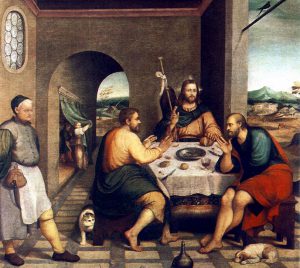You know I love sports. When I was in Rome, living in a big house with 35 priests from around the world, I would encourage almost every guy to exercise, and when it became more and more popular, Fr. Matthew from Colorado said to me, “Wow, lots of guys are going to the gym. You’re like the ‘fitness apostle.’”
So, what one word describes when someone speaks enthusiastically about something they love, such as sports or their new iPhone? Evangelization. Have you seen the way people talk about their favourite restaurant? They’re evangelizing. Whenever we share an interesting video or post on social media, we’re evangelizing about what we think is important—this is natural.
We evangelize about many things; why then are we so  hesitant about sharing our faith? (This is our fourth homily completely on evangelization. Here are the first, second, third.)
hesitant about sharing our faith? (This is our fourth homily completely on evangelization. Here are the first, second, third.)
1) We think people don’t want to hear about it. However, we already said a month ago that 46% of Canadians want to be closer to God, so people are open to sharing.
2) We don’t want to pressure people—this is good: Never pressure! However, sharing about God is not pressure, just as sharing an interesting video is not pressure.
3) St. Francis of Assisi famously said, “Preach the Gospel always, and if necessary, use words.” This saying is valid, because it gets us to focus on living a good Christian life and not be a hypocrite. However, there’s a problem: St. Francis never actually said this. Moreover, Jesus Himself never followed this saying because He Himself used words. And, if you think you’re so holy that your life on its own is enough to bring other people to God, ask your spouse or kids how holy they think your life is.
We have a beautiful Gospel passage today. It says: “The two disciples told the eleven and their companions what had happened on the road to Emmaus, and how Jesus had been made known to them in the breaking of the bread. While they were talking about this, Jesus Himself stood among them and said to them, ‘Peace be with you.’” (Lk 24:35-36).
What happens here? The two disciples, Cleopas and someone else unnamed, recognize Jesus in the Eucharist, because ‘the breaking of the bread’ is another name for the Eucharist; their hearts were burning within them as Jesus explained the Scriptures to them. Being so excited, they naturally go back to Jerusalem and share with the eleven apostles what happened. And while they’re sharing, Jesus appears among them and offers them peace.
 Now notice the context! It says, “While they were talking about this, Jesus himself stood among them.” In other words, when we talk about Jesus, He becomes present to us. St. Luke is “telling us something by connecting the… sharing of one’s faith experience with the manifestation of the Risen Lord” (Daniel H. Mueggenborg, Come Follow Me, 87).
Now notice the context! It says, “While they were talking about this, Jesus himself stood among them.” In other words, when we talk about Jesus, He becomes present to us. St. Luke is “telling us something by connecting the… sharing of one’s faith experience with the manifestation of the Risen Lord” (Daniel H. Mueggenborg, Come Follow Me, 87).
Jesus says, “Where two or three are gathered in my name, there I am in the midst of them”(Mt 18:20). And we all know how when we share what God does in our life, it brings Jesus to other people.
Let’s apply this right away to our lives. When we come to Mass or adoration, the hope is that we encounter Jesus and then naturally go out and share what we’ve received. Now I think there are three graces we can share: a great grace, an ordinary one, and one for difficult moments.
1) A great grace: On Easter we heard about Patrick Lencioni’s struggle with pride, and how, after one Mass, he asked God to take his pride away. This was for him a life-changing encounter with Christ at Mass. However, this grace wasn’t meant just for him, but for all. Thank God he shared it, because a number of people told me how his story resonated with them.
This past Thursday was the funeral for one of the monks, P. Lawrence Bilesky, at Westminster Abbey. During the homily, it was mentioned that P. Lawrence was tempted at one point to leave the monastery, which meant abandoning his first and true love; he had heard the call of Jesus and responded, but now he was choosing to turn away! In one conversation about this, his superior told him with love, “Father, if you wish to go the way of disobedience, go, but I am not going to follow you to hell.” Hard but loving words, because when someone’s about to turn away from God and is blinded by pride, lust, greed, or anger, sometimes the only way to wake someone up is with strong words. So he chose to love and stay until the very end. When he was dying, he was surrounded by a dozen monks and he asked forgiveness for the times he had hurt them. Then they, in like manner, asked forgiveness from him. That was the grace of the cross!
This homily strengthened a lot of people because it showed the reality of temptation, the humanness of the monks, and the power of God’s grace! They shared it with me and will do so with others.
2) An ordinary grace: Sometimes at Mass we get one helpful truth or come in contact with love in a simple way. Why not share this?
 Someone, for instance, mentioned how our community has a unique reverence and love for the Eucharist. During Good Friday, many people noticed how, when a person dropped the Eucharist on the floor, we had to purify the floor by kneeling down, wiping the floor with a special and wet linen called a ‘purificator,’ so that any crumbs that fell would be picked up. This person said that this simple action showed her the Host is Jesus, and that love, care and respect are due to the Eucharist.
Someone, for instance, mentioned how our community has a unique reverence and love for the Eucharist. During Good Friday, many people noticed how, when a person dropped the Eucharist on the floor, we had to purify the floor by kneeling down, wiping the floor with a special and wet linen called a ‘purificator,’ so that any crumbs that fell would be picked up. This person said that this simple action showed her the Host is Jesus, and that love, care and respect are due to the Eucharist.
People ask us all the time, “How was your weekend?” and we can say, “I had a good time at church,” or, “I’ve been thinking about something I heard at church,” and, if they’re interested, we can tell them more.
3) A grace for difficult moments: Sometimes we don’t feel as if we get anything out of Mass—that’s a normal feeling, but it’s not true because we always receive something. Someone once said, “Father, when I read the Bible I can’t remember anything I read,” and the priest said, “If a container is filled with holes, and someone pours water into it, it may not be able to contain the water, but it’s still washed clean each time.” So, every time we come to Mass, we may not feel filled, but we’re still brought into God’s presence, offered grace, and reminded of our vocation.
This means we have a choice: All of us, at one time or another, have left Mass angry and annoyed—it’s happened to me. But think: We’ve come into contact with God, so we still have a choice, we have received the grace not to be grumpy. At the very least, we can share with others our attempt, our effort to be loving, and not bring others down.
I remember meeting a woman whose marriage was starting to collapse. She wrote me a long e-mail and asked how she can be cheerful for her young children who need a good mom, but she couldn’t be cheerful because her husband wanted nothing to do with her. So, what did she have to offer? I replied, “Maybe God isn’t asking you to be cheerful. Maybe He’s asking you just to love and show your kids how to be faithful even when things are falling apart. Maybe that’s the lesson you can teach them.” The same is true with us: When we leave Mass, perhaps God just wants us to do our best, not fake it, but share with others that we’re struggling and that we’re still trying to do His will.
This Gospel has reminded me of a truth: We encounter Jesus in the Breaking of the Bread. The greatest gift we have as Catholics is the most Holy Eucharist. That’s why I never miss Mass; I could, but I always want to be there. And every single time I celebrate Mass or go to adoration, I receive either a great grace, an ordinary one, or a grace for difficult moments; and then I share it—that’s evangelization. It’s simple: We meet Jesus and when we speak about Him, He’s present among us.